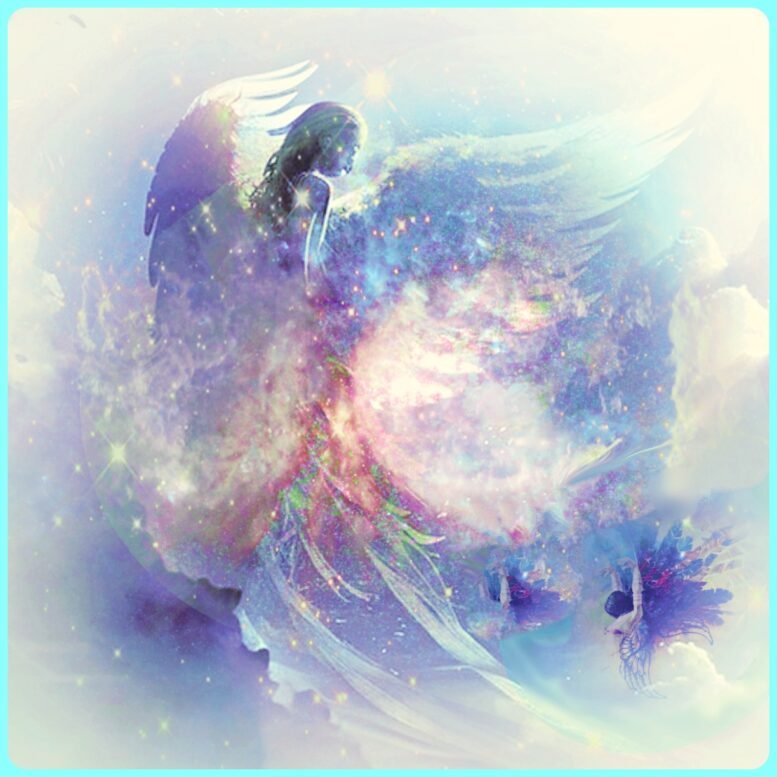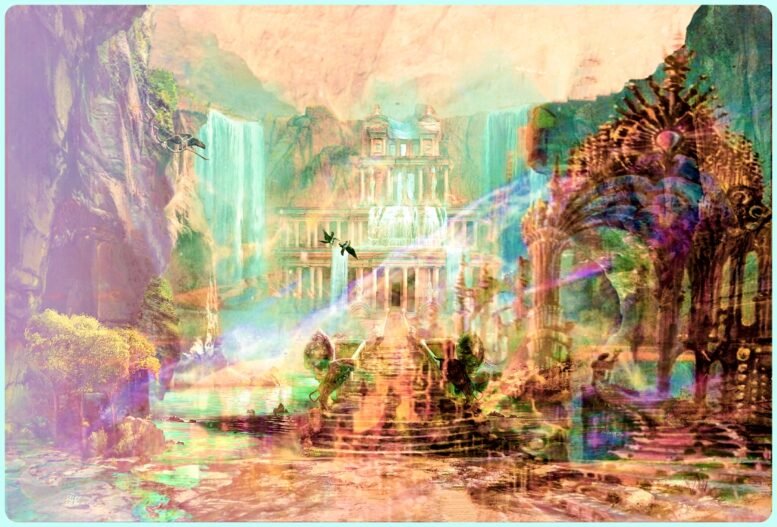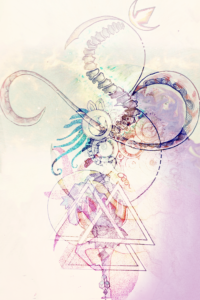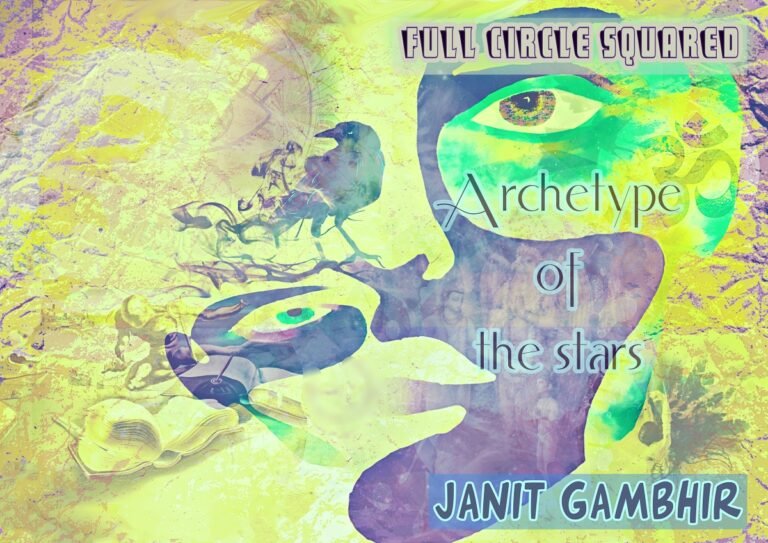Chapter one : Champion of Fire – Agni
Agni – The god of fire.
Enclosures of light hone to sound as it cascades across space.
Attuned and in-tune, intoned to understanding, flights of stars sweep through the galaxies, in notes and dotes connoting to divinities in seasons of fundamentally profound implicities.
Agni, the grand Fire. The priest of heavens and Earth is summoned to the Grand Dolphin council of the Universe.
Precedence pauses, looking back at itself, uncertain of the direction that time would take to flow to a single thread.
Grooves of bearing move, feeling for the harbour that allows for the Universal gong, in the heart, majestically to the chakra in the healing of the unstruck sound. A large golden symbol moves to surround, spirals abundance to focus, grounds the moment and a creative reverb abounds.
Seated in a a large Dolphin shaped conference hall upon pedestals are several animal godlike beings, the hall itself shining golden immense, regal to view.
A scene appears as if summoned by nowhere, an ethereal cloud of environment that was space before the gong, and elapses to reposing song-like form.
The star-form of Agni is expected to face this council of high gods, and is appearing presently. Agni is the god of the fire, and a giant when he walks upon the Earth.
It is the fate of that Earth which is being decided. There 7 + 1 looming sentinels known by many names, the Seven sages of the constellation Ursa Major and the great sage Vishvamitra in tow, the Saptrishi’s Atri, Pulasta, Pulaha, Vasishta, Kratu, Marichi and Angiras. They tower standing, having presented themselves to Mount Meru at the purveying lord Indra’s behest, convening the council.
Suddenly in the middle of the gods’ palatial hall is a thread of luminous smoke. Of its world, it was the ‘Dhoomketu’, the banner of fire poetically called, to others it was an asteroid seen flying through the skies.
An ancient script passes through the breeze.
“Fire, when met and summoned, priest of every ritual and sacrifice of action. Fire, like the rapt of attention, the soother, the teacher, the saker, the element of the partaker. The fire, our symbol to alight.
The song of the celestial’s victory in the Universe’s way. The convoy of balance and knowledge easing our days.
The delighted groomed fire, endowed to the respective virtue of the jewelled solar patterns, the brethren of the Earth’s consorts, and the Sun in the cyclical seasons of our evolving form.
Agni has arrived.”
~ ~ ~
Swaha
“I’ve come to claim my love story.”
He laughed, almost scoffing at being taken by surprise. He was the youngest god of the Earth, Agni. The first god to borne upon the Earth and kin to all that presented themselves to the Earth thereafter.
This he wasn’t expecting. Swaha stared at him. She was serious.
Swaha was a shining star, and by legacy would be one of the first few that habituated the New Earth. Her own father had helped fashion the gods abodes for Earth after All.
–

Agni was quick to his composure. In a world of relative divinities, he was an absolute.
All the other gods on the earth were subject to variations and fluctuations of power. Each god had a shadow, which wielded their influence and collected their worship. This shadow was often a greater personality than the gods themselves. Part of the gods journey as token of the earth was to resolve their shadow as a way of giving back to the Earth, and ensuring their own passage through the stars.
And besides, when the gods slept or rested, their shadow was their cocoon for restoration and healing, as well as reflected their worship.
That shadow was then immortalised as a star, and the gods could then come and go from the Earth.
So resolving their shadow and getting immortalised with a star was like a coming of age for a god or a celestial. And at the time, Earth was the only planet immortalising the celestials in this galaxy. Mars had stopped, and Venus was in no mood to begin.
But Agni had been born with Stardust, while it was the Sun-god’s turn as Indra, the ruler of the Sky.
So Agni had no concern for immortality or such. And as long as the Sun-god’s influence would not wane, and the Earth would remain, at least upon the Earth, Agni’s the fire-god’s supremacy could not be challenged. Besides, Agni’s shadow was the one that kept tabs on all the celestials on the Earth anyway.
Now Agni was notorious for his flits of passion when he was enamoured.
And Agni had been recently and very notably enamoured by the virtues of the Sapt-Rishi’s consorts.
The Sapt-Rishi’s were the great sages of the Age, accorded in status as sometimes even higher than the gods. It came to the reigning Sapt-Rishi’s decree upon which stars could shine and immortalise in the known galaxies. So all gods and Celestials would be subject to the Sapt-Rishi’s judgements and their stories would keep repeating until the Sapt-Rishi’s deemed otherwise.
And the Sapt-Rishi’s were selected by the gods and celestials for every age after their inception, rotating to their homestay at each Nakshatra every 100 years of the Earth.
So all gods and celestials that wished to preside, visit or habitate Earth or its Sky sought favour and often feared the Sapt-Rishis.
All but Agni that is. This brash and potent young god had his own crosses to burn, and naughts to bear.
“Dwadasanta! Fast-forward this story, why don’t you?”
Dwadasanta was Agni’s shadow. And it had the unique skill or toggling the past and future along the Earth, the sky, and the Void. It had patterns of twelve, and each resided a constellation that could command itself to archetype the Zodiac.
“Wait!”
Agni paused. He knew about her shadow, amongst the best known of the gods. It was called Swara. And it was sound that had meaning. Equal light and equal power, a quality that no other celestial had quite been able to emulate.
And Swaha was known to wrap herself in body inside of her shadow, ‘Swara’. And so when she appeared in full form, she looked as tall as the visible sky.
Agni was tempted to make her use her shadow, but sidestepped the instinct. He would try being patient.
Dwadasanta held a doorway open in the fabric of time and space.
Agni turned to her…
Swaha paused. That was the first ever pause in the new gods.
Swaha instinctively had her shadow outside of her control, yet nothing had happened, her sense of meaning ricocheted, and she didn’t understand herself.
She blinked and addressed him, “I know what you’re about to do.”
“Well, I’m not anymore. Am I?”
She pointed at the gateway Dwadasanta had opened, her sense of meaning still barely finding its bearing.
“So you coming or not? You’ve got your love story. Where do you want to start?”
*

OM
A bird of flight flew past a view of the waters across open space. A sound fluttered a rhythm until a twine became melodious.
Undeterred by its own discerning, its right wing flapped a lingering primordial sound.
Then almost as if reaching further, the left wing lifted a notion of its own to match.
As if like a songbird, the feathers flickered an ‘m’ tailoring the beat to sound.
Yore and lore met in a fleeting merge.
It settled an ‘Aum’ touched ‘Om’, resonating peaceful rejuvenating. A half sound grazed and braced upon its head.
The bird heard words as it flew past, almost as if its own form was being described, a ship to its mast.
“Upon its legs were rajas and tamas, in grounding if and when to speak. The sattva of the purified, its body.
Righteousness its right, that which was left corrected yet the inarticulately inaccurate.
And like the tattvas or principles to the moment, it soars, as if it belonged.
The seven worlds likened to breath, the space through the chakras glimpsed.
Bhu along its feet
Bhuvar upon the knees
Svah-loka at the hips
At the navel the Mahar-world, or the mid region be.
At the heart, the jana(r)loka,
At the neck the tapau(s)
Between the eyebrows at the temple, the satya(m)-loka.
Bringing them, Om.
Hummed to hymn in knowing, the vowels in flight, and the seven sounds of delight.
Bridging to be, an ascending bird, a quintessential word.
The first part lauding the fire, 3 and a half sounds in form.
The second offered in the waters, an equivalent beneficence abound.
Likened the golden form raised within a solar orb, eternity absorbed and absolved.
The third to the care of the wind, watchful like an age guiding and gliding within.
The wondrous Om, intoned and sounded,
To the attentive, hearing listening… conferred and well-rounded.
The first part, blending after offered, the second, allowing the moment’s blessing to be, as received.
The rich in sound building to a lightning surround.
The third indeed profound to flight.
Onto fourth like the warm wings of insight.
To the attentive, thoughtful and considerate.
Swayed faith, familiar fulfilment waded to way.
Inferred to stay.
Only hinted, like gentle whispers, carefully awakened like the instinct that answers.
Pause to be, redeemed, like nature’s quill to right itself.
To greet and listen, for better yet.
To know the inner silence.
Stored for peace…
Creative form, like breath to a breeze.”
A celestial figure played luminous a musical instrument and listened to a song as the bird of flight flew across the horizon.
~

Narada, the wandering sage and King Trisanku
The Scenery shone from afar appearing in view to a large regal hall.
The palace was set on several glistening stars of a constellation, and the ruler was the great king TriSanku, and the night was of the messenger in question, Narada of his wayward wanderings.
Trisanku was reciting perennial monologues to a few surrounding palace guests flirting a little with some others, and they are swaying uncertain whether they’ve heard it all before, but listening all the same with a mix of curiosity and reverence.
Interrupted to an attendant, Trisanku seems harried, but shakes off the familiar feeling and winds his own own tales to his guests and excuses himself.
He is ushered into a room upstairs.
In the room sits the great wandering sage god Narada, looking winsome as ever, even though he was surely bearing grave news.
“Well inspiration is the only respectable form of flattery after all.” Narada jokes at TriSanku, who hurriedly closes the door to have privacy with the messenger god.
“Why are you here now, Narada? And that too mocking me, instead of chanting Narayana twice over as you usually would.”
“Would that I could, old friend. But it seems like you would be doing that for a while.”
Trisanku sat down, almost in resigned disbelief. “No?”
“You had three shots to lose. What happened last night?”
“The battle, King Vala. He was strong. But I broke him down. He held on, But then Vritra showed up reenforcing him, and we were evenly poised. It felt uncertain so I retreated.”
Narada smiled, but darkened his eyes.
“In other words, you had an equal chance of winning, if you had not chosen doubt. Aren’t you supposed to be the champion of Faith?”
King Trisanku opens his mouth to protest, but says nothing.
“Three times you were allowed doubt to shift the gods in their starry domains. Then the game changes, remember. Its time for the new age now.”
King Trisanku resigned his shoulders, “Who’re they sending in?”
Then his eyes widened. “Good god, not Agni?”
Narada smiled.
“He’ll burn it all down!”
“And from the ashes will bring Garuda’s birds of meaning to populate it right back.”
“And Indra?”
“Indra waits. First Vala, then big bad Vritra for his holy tryst of immortality.”
“And who’s going to champion the light to Earth?”
“Martanda.”
“He’s not ready!” TriSanku implored.
“And you were?”
“Fair point.”
“He’s going to think all the stars have deserted him, you know that though right?”
“Thats Martanda’s problem, or rather Surya’s when he takes over. He will be the greatest god Earth will know after all.”
“After Agni.” Trisanku interjected.
“Well technically after Shiva, then Agni, then Surya but still that’s not the consideration, right now.”
“What’s the consideration then?”
“How to get you into heaven?”
“Wait, I’m not going already in. So what do I have to do now?”
“That’s the interesting part.”
“And… this means the Earth won’t know me at all?”
“Well, they’ll still know you in everything sweet, and in some of their holiest sounds. And for anyone that looks for their soul, you’re still going to be where they find it. You are going to be the Crux of matter as a constellation after all, only a true reflection of you offers it.”
“And who’ll carry my judgement then?”
“Saturn, or rather Kyavan, when he’ll show up for them.”
Great king Trisanku took a deep breath. “Okay, what do I have to do?”
Narada explains.
His lines flow as honeyed voice to images and words of the Saptrishi Vasishta, the star, who is one of the Great Bear Ursa Major constellation sage-gods. Trisanku’s childhood and adolescence saw great Sage Vasishta as his guru and mentor, with a young Trisanku at his obescient best.
Suddenly reflections shift to a great brooding god, as first a young strapping warrior VishvaMitra, who wins over the hearts of the entire universe, then king VishvaMitra, great warrior and benevolent ruler. Until a white haired king starts to sit in meditation, and becomes stronger and very somber.
He then appears to his brethren as the great sage Vishvamitra Lubdaka known to become still for thousands of years in meditation, and then without warning shaking the entire universe by waking up.
“So Vishvamitra has amassed way too much power. So you, are going to help him use it up. That way, we have balance, and I get to go around chanting Narayana Narayana again.
You, the great king Trisanku are going to go to Vishvamitra, and you are going to tell him they are not letting you into heaven, and the final decision is Vasishta’s and that you want him to teach you how to be stronger and be sweet enough to one-up Vasishta, among the best and brightest of the stars.”
Trisanku interjects, “should I talk like that to Vishvamitra, he gets annoyed so easily?”
Narada proceeds. “That’s the point. To call Vasishta best at anything will surely flare up Visvamitra, he still hasn’t forgiven Vasishta for ending up with Arundati after all.
And then, when Vasishta will say that he refuses to pass judgement by favouring his pupil Trisanku, Vishvamitra will want to show Vasishta how a true guru should behave, and use his entire power to create a brand new Universe to parallel this one.”
“Really, he’s that powerful?” Trisanku sounded disbelieving.
“That’s the thing. There are two of them as Vishvamitra. He just doesn’t know it yet. He thinks you have to take a leap of faith in going to him, what he doesn’t know is he’ll be taking a leap of faith to create a new universe!”
Narada starts laughing merrily.
“Narada, you really are cruel!” Trisanku says to him shaking his head.
“Narayana, Narayana!”
“Narada, you know I don’t really care about getting into heaven.” Trisanku said smiling.
“That’s Okay, Vishvamitra doesn’t really want to create a universe for himself either. But he’ll be friend to the Earth after that.”
~~
Dwadasanta
A super luminous being that has so far been the voice of Dwadasanta is floating or levitating just above the surface of the Earth with part-transparent and effervescent rays flying all around him. Across from him, is a female giant, She is called Kathaiṃ Himavati, and she was the first and last sentient Mountain. When time came calling, she became one with the Ganga, and as part of the milky way, she would then grace the Earth. Dwadasanta and Ganga are great friends, Dwadasanta was there in another era when Himavati became the perfect celestial or a Sura from Asura form of giants. And now Dwadasanta often lingers around the Ganga’s holy riverbanks and cascading temple steps, singing in celestial voices as god stories.
“Dwadasanta, will you stop talking about yourself like that in the third person.” Said Kathaiṃ. She pauses and starts talking again.
“I wanted you to tell me how you got so interested in stories of the planets and why you started keeping tabs on the stars.”
“I overheard an old man talking to a little child about stars once, and the Aditya in me got inspired.”
“Inspired to do what?”
“Haha, inspire of course. Am I not inspiring you right now to hear stories?”
Kathaiṃ looked away for a moment. “Not as much as I would like. I know some Adityas too. A lot of them meditate along my river banks over the years. A few of them sages.”
“Probably not in the way I mean the Aditya in me, although I do know a lot of venerable sages who chose to take that name over time. But I prefer the innocence associated with my original form. And I’m one of the first Adityas, which is a consort sun, so I’m easily the first you’ve met so far in all likelihood.”
“What do you mean you’re the first Aditya I’ve met. I’m time itself, or I will be, won’t I?”
“You’re the sanctity of Time, yes. So you can flow to the past and the future as you please, yes. But Time itself moves in a cyclical pairs. You are either the mountains as Kathaiṃ, or Ganga, as time. As you please, yes. But once at a time, not simultaneously.
Besides all of us have spectacular personalities, I’m sure you would have told me about the other Adityas if you met them, there are so many stories, sometimes even I have to sift myself to filter history from impressions. ”
Kathaiṃ pouted some more, “Yes, but I want to be.
Flowing simultaneously that is.”
“Ha, way to stick to the point! But yes, pouting giant, why do you think you know me! And you just looked like your old self for a moment there.
And I can act as time, in this Dwadasanta form. So I can offer you the reflection in simultaneous visions when I’m around. That’s how I first incarnated after all.”
“But I thought you first incarnated as a tooth!”
“Now that’s the story of Ancient king Vala, the one I was trying to tell you.”
“Ah! But I wanted to hear the one about Indra moving palaces in the sky, but that’s okay” Kathaiṃ attentively sat down. “I’m listening.”
~ ~
A passing breeze shifts, a sound veers its way through the wind, as if blessing, cross-correcting almost in wing tipped whispers.
~

Full Circle Squared – Archetype of the Stars – Chapter 1 – Agni : Champion of Fire. – Part One.
A coat of quotes and passing poetry
"Surya Gayatri - The hymn. (Rudra)
Om haam tanmeshaye vidyamahe, vagvishuddhaye dheemahi, tanno Rudro prachodayat.
Suryapustakanakam kritva Suryamantreh prapoojayat.
Om haam heem hoom haim haum ham Shivasuryaye namah.
Om ham Khakholkhaye Suryamurtaye namah.
Om hraam hreem sarva Suryayi namah ||
Om salutations of being from body and spirit, to knowledge and sentience, purified and evolved in expression, hailing divine inspiration, to Almighty Rudra that offers us his form we pray.
Fashioned from starstuff, the vessel of the Sun, illuminating into life, brilliant fire of the sun, the sun shining words.
Om, salutations of being into the directions of space. Guide my being, as the sun, as the root of existence, like the sun. Shiva, supreme, that is, all that is.
Om, in bowing to the hidden name, no longer. Now unlocked, in me, archetypical sun, in his image, in his form affirmed.
Om ignited, Om infused, as the sun, the eternal, all of it. Om Sun ||
"Surya Gaytri | Translation

